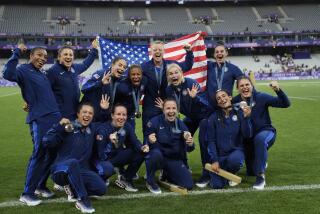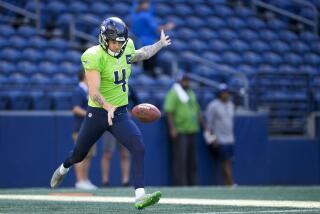Hard Ball
- Share via
The back door at Fitzgerald’s Pub in Huntington Beach is left open to provide patrons a view of the action taking place at Langenbeck Park.
In the early evening shadows, under high-tension electrical lines, a dozen or so men in T-shirts and shorts toss about an oblong white ball and chase each other. They are members of the Unicorn Rugby Football Club that begins play Saturday in the USA Rugby National Club 7s championships in Conshohocken, Pa.
“We do this for the love of the game,” said Rod Samuels, who works in the travel industry but does not collect a salary as the Unicorn’s coach. “I have seen the potential in American boys, but the national-level teams aren’t that good. Maybe if we put this thing together the right way, this sport might just do well in this country.”
Practice fields are hard to come by. The Unicorns make use of Langenbeck Park, a grassy sliver of land bordered by the back of a strip mall on one side and a housing tract on the other.
“The fact that we qualified for this event shows the level of commitment to this sport that these blokes have taken on,” said Raymond Viers, the club’s manager.
Part of the unwritten tradition of rugby are the postgame gatherings of teammates and opponents alike in local bars and taverns like Fitzgerald’s.
“This is the only sport I know where we beat the hell out of each other and then afterward sit down and have a beer with our opponent,” said Mark Beythoun, an accountant from England who has been in the United States for three years. “It’s where the home side is the host team and presents the men of the match and player of the day awards, things like that.”
Indeed, members of the Unicorn are a passionate, hardy lot. Their team picture, in which they’re clad in gold, green and white uniforms, hangs on a back wall at Fitzgerald’s. On the 15-man roster are players from six countries, including Tonga and Scotland.
Viers learned the game in his native Australia, where professional rugby players are national heroes with product endorsement contracts and annual salaries the equivalent of $150,000 in U.S. currency.
The Unicorn and the Belmont Shore Rugby Club of Long Beach are the only two teams from Southern California to qualify for this year’s 7s nationals.
“In May, back in Worcester, Mass., we lost to a team from Chicago, 31-30, in the last second of the national Division II [15 players-per-side] rugby final,” Viers said. “All the boys were standing around at the end wondering what to do. I think those who came back this summer were more determined.”
Seven-a-side is an Americanized-version of rugby. It’s an off-season activity for many who might otherwise take time out to mend from nine months of regular, 15-a-side competition.
“It’s the arena football of rugby,” said team captain Phillip McDonald, who came to the United States from Australia 3 1/2 years ago. “It’s what some guys do in the summer to stay in shape.”
Only three forwards and four backs are on the field, as opposed to the standard 15-man teams known as “sides.” Scrums consist of three players per side, not eight, and when a penalty kick is awarded, the kicker isn’t allowed to tee-up the ball. Instead, it must be a drop kick.
Tries (touchdowns) are worth five points, conversions are two points and penalty kicks are three points, the same as in the 15-man game. A standard rugby field--called a pitch--is used. It measures 140 meters long by 65 meters wide.
The Unicorn, founded in 1970, counts about 55 members, most of whom prefer the 15-a-side game. A growing number of players, particularly those born in the United States, find the 7s to their liking because it is an open-field game with more scoring opportunities and favors faster runners.
“This game is very wide open,” said referee Josh Tameifuna of Garden Grove, who showed up to observe a Unicorn practice one night. “You’ve got to have speed to play, otherwise you’re dead.”
Tameifuna, who hails from Tonga, is president of the Southern California Rugby Referee Society. He said the exciting seven-a-side game has potential to attract more U.S. players to rugby. In fact, he said the sport’s recent growth has made it difficult to find enough referees for the 32 matches he oversees each weekend.
Jeff Chadwick, a wide receiver for 10 years in the NFL with the Detroit Lions, Seattle Seahawks and the Rams, before they moved to St. Louis, watched a match about four years ago and got hooked. He is one of the Unicorn’s speedier players.
“It is a combination of football skills, wrestling skills and soccer skills . . . with a lot of hard-hitting,” said Chadwick, who plays a back position. “It’s a little more open than football. Although you have to make tackles, you have more liberty to roam around.”
Andrew Wind, who returned punts for Ocean View High’s and Occidental’s football teams, said he fell in love with rugby while in college. It reminded him of a more physical version of the soccer he played as a child.
“There is more tackling in five minutes of rugby then there is in a whole football game,” Wind said.
Tameifuna predicted the Unicorn, under the tutelage of Samuels, who is from New Zealand, could eventually become one of this country’s top clubs.
“It’s a very, very solid club,” Tameifuna said. “It should be among the top four contenders in the nation next year.”
After several seasons of lackluster performances and in a reversal of fortunes, the Unicorn was recently awarded the Division II national 15-a-side championship trophy. Officials ruled the Chicago team that beat them in May had used ineligible players.
That victory, coupled with the club’s success in 7s, means the Unicorn will automatically be moved next season to the top echelon of the sport, Division I. It won’t hurt their reputation at Fitzgerald’s, either.
More to Read
Go beyond the scoreboard
Get the latest on L.A.'s teams in the daily Sports Report newsletter.
You may occasionally receive promotional content from the Los Angeles Times.










